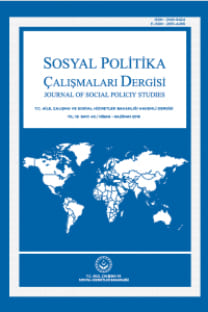Anne Eğitim Programının Etkililiğinin Değerlendirilmesi
Türkiye’de gelişim psikolojisi literatürü ile aileterapileri literatürünü birleştirip uygulamaya dönüştürençok az çalışma vardır. Bu çalışmada, gelişim psikolojisive aile terapileri literatürü kullanılarak bir psiko-eğitim programı hazırlanması ve programın etkiliğininölçülmesi amaçlanmıştır. Çalışma Anne EğitimProgramı adı altında hazırlanmıştır. Programın içeriğindeçocuk gelişim dönemleri, aile içinde problemlerlebaş etme ve iletişim becerilerinin arttırılmasıylailgili konulara yer verilmiştir. Çalışmada, ön test-sontest uygulamalı, tek gruplu, yarı deneysel desen kullanılmıştır.Programa 17 anne katılmıştır ancak 6 annegrup sürecinde gruptan ayrılmıştır. Program, her biriyaklaşık 2 saat olmak üzere, toplam 12 oturum olarakplanlanmıştır. Grup üyelerinin benlik saygısı, yaşamdoyumu, baş etme ve iletişim becerileri konularındaön test-son test ölçümleri yapılmıştır. Verilerin analizinde;bağlantılı örneklemler için Wilcoxon İşaretliMertebeler testi ve t testi kullanılmıştır. Bu araştırmanınbulguları, uygulanan Anne Eğitim Programının,değişim yaratması amaçlanan alanlarda, etkili olduğunugöstermiştir. Annelerin benlik saygısında ve başetme becerilerinde, eğitim öncesine göre eğitim sonrasında,istatistiksel açıdan anlamlı bir artış söz konusudur.Annelerin yaşam doyumu düzeyleri, eşleri ileyaşadıkları ilişkiden memnunluk düzeyleri, cinselyaşantılarından memnunluk düzeyleri alanlarında,eğitim öncesine göre eğitim sonrasında, görece birartış vardır.
Anahtar Kelimeler:
Psikoeğitim grubu, aile terapileri, çocuk gelişimi, anne eğitimi
The Evaluation of the Efficiency of Mother Education Program
Studies that use both the development psychology and family therapies literature together are very scarce in Turkey. The purpose of this study was to prepare the psycho educational program that takes into account both the developmental psychology and family therapies literature and evaluate the effectiveness of this program. The title of the program is “Mothers Training Program”. The content of the program is made up of the topics of child development, coping with intrafamilial problems and communication skills. In this study one-group pretest-posttest quasiexperimental design was employed. Though 17 mothers participated in the group, 6 of them dropped out during the group process. The program was planned as twelve sessions that lasted approximately 2 hour each. Pretest and posttest was used to determine the effects of the group process on participants’ self-respect, coping mechanisms and communication skills. Data were analyzed with Wilcoxon Matched Pairs Singed Ranks test and t-test. Results showed that the Mothers Training Program was effective on the variables intended. Statistical significant increase was observed in the self-respect and coping skills of mothers when pre and pos test were compared. There was a relative increase in mothers satisfactions in the area of sexual relationship with their partners and life satisfaction at the end of the training program.
___
- Blocher D.H. (2000). Counseling:A developmental app- roach (4th ed.). New York. Wiley.
- Bekman S. (1998). Eşit fırsat: Anne-çocuk eğitim prog- ramının değerlendirilmesi (1.Baskı). İstanbul. Ya- pım Matbaası.
- Corey G., Corey M.S., (2002). Groups Process and Practice (6th ed.). Pacific Grove.
- Durlak J.A. (1998). Primary prevention mental healt programs for children and adolescents are effe- ctive. Journal of Mental Health, 7 (5), 463-469.
- Girli A. (2002). Otistik çocukların ailelerine yönelik grup rehberliğinin ailelerin kabul düzeylerine etkisi. Yayınlanmamış doktora tezi. Dokuz Ey- lül Üniversitesi, Eğitim Bilimleri Enstitüsü. İzmir.
- Puckering C., Rogers J., Mills M ., Coort. A. D. ve Graff M. M. (1994). Process and evaluation of a group intervention for mothers with parenting difficulties. Child Abuse Reivew, 3, 299-310.
- Sanders M. R. (2000). Community-based parenting and family support interventions and the prevention of drug abuse. Addictive Behaviors, 25 (6), 929- 942.
- Smith E. P., Gorman-Smith D., Quinn W. H., Rabiner D. L., Tolan P. H. ve Winn D. M.
- (2004). Community-based multiple family groups to prevent and reduce violent and aggressive be- havior. American Journal of Preventive Medicine, 26, 39-47.
- Yavuzer H., Aydoğmuş K., Batlaş A., Batlaş Z., Davaş- lıgil Ü., Güngörmüş O., Konuk E., yınları.
- ISSN: 2148-9424
- Yayın Aralığı: Yılda 4 Sayı
- Başlangıç: 2012
- Yayıncı: Aile,Çalışma ve Sosyal Hizmetler Bakanlığı
Sayıdaki Diğer Makaleler
Vazektomi Olan Erkeklerin Yönteme İlişkin Görüşlerinin İncelenmesi
Gülhan ÇORAK, Prof. Dr. Süheyla ALTUĞ ÖZSOY, Arş. Gör. Dr. Bilgin KIRAY VURAL, Dr. Bakiye TUNCAY
Yaşlılıkta Yaşamın Anlamının Refah Göstergeleri İle Yordanması
Anne Eğitim Programının Etkililiğinin Değerlendirilmesi
Genel Lise Öğrencilerinin Aile İşlevlerinin ve Denetim Odaklarının İncelenmesi
Uzm. Psikolog Danışman Melike DOĞAN, Doç. Dr. Esra CEYHAN
Duygusal Refah: Gençlerin Algılarının Kavramsal Analizi
Doç. Dr. Emine ÖZMETE, Dr. Ayşe Sezen BAYOĞLU
Düşük Ücret ve Çalışma Koşullarının İşçilerin Aileleri ve Sosyal Çevreyle Olan İlişkilerine Etkisi
Toplumsal Yaşamda Sanat Eğitiminin Gerekliliği ve Medyanın Rolü
